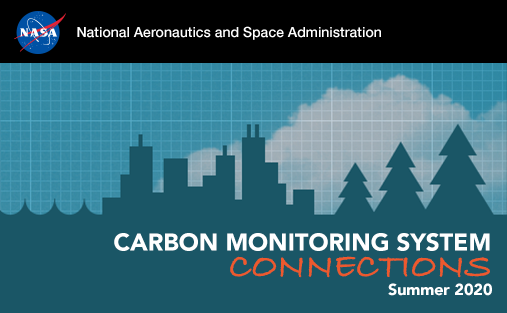Words from the Science Team Lead
The goal of the NASA- Carbon Monitoring System project is to prototype the development of carbon monitoring capabilities needed to support U.S. needs for monitoring, reporting, and verification (MRV). Initiated in 2010, the project is maturing into one of the most exciting and productive initiatives in Earth Sciences. Fundamental to the effort, is the close collaboration between scientists and stakeholders to produce the best and most relevant science information.
To date, the project has produced an impressive 457 publications, with 31 in the highest tier journals (Nature, Science, and PNAS). Collectively, these papers have been cited over 18,300 times. The project has also produced and archived 111 related datasets, downloaded over 47,000 times.
During the past year, 29 projects continued to make progress on their proposed research, 15 projects ended, and 15 new projects were selected in response to ROSES-18 solicitation. These projects will continue several successful prototyping efforts, add new capabilities particularly in areas of wet carbon (wetland, aquatic, and marine stocks and fluxes), and build on our efforts of stakeholder engagement. In September, we presented an overview of the program at the NASA Terrestrial Ecology Meeting. In November 2019, we held our 6th Science Team Meeting, which began with a one-day Applications Workshop focusing on stakeholder needs, followed by two days of science presentations and discussions. Finally, in December 2019, we led three related sessions at the American Geophysical Union Fall Meeting. These sessions attracted 42 abstracts resulting in 16 Oral and 26 Poster presentations. The sessions were anchored by invited speakers Dr. Ralph Keeling and Dr. Inez Fung. At AGU, a preliminary synthesis of CMS Phase 2 activities was presented, along with a new Hyperwall presentation of major CMS highlights.
In 2020, despite the disruptions caused by COVID-19, we are pushing ahead to continue progress on all of these activities, complete the Phase 2 Synthesis Report, and prepare for the next Science Team Meeting and AGU meetings later this year. Meanwhile, we have refreshed and extended the Focus Collection on Carbon Monitoring Research and Applications in the journal Environmental Research Letters, invited a key set of synthesis papers form Working groups, and expanded stakeholder engagement through the CMS Policy speaker series. Finally, we enthusiastically note the current ROSES-20 A.6 Carbon Monitoring System solicitation calling for the next generation of CMS proposals due October 16, 2020.
-George Hurtt, Science Team Leader
NASA Calls for Proposals
ROSES-2020 Program Element A.6 Carbon Monitoring System requests proposals for investigations that will advance products toward the CMS end goal: development of prototype carbon monitoring systems from an Earth’s system perspective. Areas of interest include terrestrial, atmospheric, and aquatic realms. Proposal emphasis must be directed toward continued development of the established CMS pilot studies (see https://carbon.nasa.gov), synergistic advancements from past CMS activities, as well as acquisition, quantification, and development of prototype CMS system capabilities that can improve existing and develop new data products toward achieving the levels of precision and accuracy required by current carbon trading activities (e.g., certification of emissions reductions). Notices of intent are requested by August 31, 2020 and the due date for proposals is October 16, 2020
ROSES-2020 Program Element A.5 Carbon Cycle Science solicits proposals for research focused on carbon stocks and fluxes between and within freshwater, marine systems, and land ecosystems, and their exchange with the atmosphere. It also targets improving understanding of carbon cycle processes and feedbacks in critical ecosystems that are particularly vulnerable to environmental change. Substantive use of remote sensing and/or airborne data is required in all studies.
ROSES-2020 Amendment 49 releases final text for A.5 Carbon Cycle Science. Notices of intent are requested by September 28, 2020 and the due date for proposals is December 3, 2020.
NASA CMS Science Team Meeting - 2020
The CMS Science Team Meeting will be held November 17-19th 2020 online. As in previous years, there will be a Stakeholder’s Workshop held in conjunction with the meeting and it will also be a virtual meeting. Information about the agenda, registration and posters will be posted on the CMS website in the coming weeks.
USFS-NASA Virtual Pitch Fest Highlights
June 2-3 2020
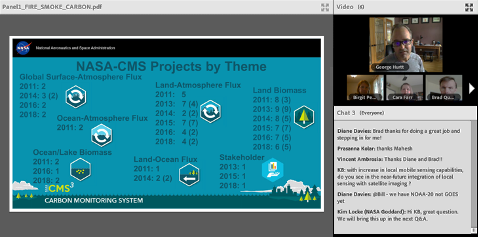
On June 2-3, the CMS applications team helped co-host and moderate (with USFS personnel) the NASA-US Forest Service Virtual Pitch Fest, a forum where participants shared ideas to pilot NASA technology to help address priority land management issues and decisions. Featuring 52 ideas “pitched” by the land and forest management community as well as remote sensing researchers, the event provided an opportunity to exchange information on needs and capabilities and identify opportunities for collaboration on new tools and applications. There were 322 participants from the following: 66% government agencies (115 registrants from USFS and 80 from NASA); 18% academia; 5% private sector; and 5% international. The CMS Science Team Lead, George Hurtt, along with CMS Science Team members Andy Hudak, Grant Domke and Sassan Saatchi participated on a Fire, Emissions, & Carbon Panel during Day 1 of the event, where they provided insights on key opportunity areas for utilizing NASA technology to support the management of fire, smoke, and carbon. Also, a total of 12 pitches included CSM Science Team members and stakeholders as part of their proposing team.
Working Groups
- Flux Working Group
led by Abhishek Chaterjee - Measurement, Reporting, and Verification (MRV) Working Group
led by Pontus Olofsson - Methane Working Group
led by Daniel Jacob - Uncertainties Working Group
led by Robert Kennedy - Biomass Working Group
led by Andy Hudak and Laura Duncanson - Wet Carbon Working Group
led by Lola Fatoyinbo - Stakeholder Working Group
led by Edil Sepulveda Carlo
NASA CMS Applications - Policy Speaker Series
2019 Lunch Time Policy Speaker Series Talk Highlight
The CMS Policy Speaker Series brings together carbon data stakeholders to bridge CMS science with user needs, inform CMS PIs of specific end user opportunities and provide new avenues to improve and develop CMS science and data products.
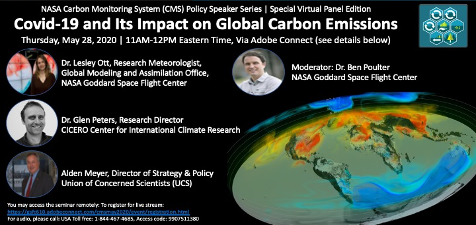
The CMS applications team hosted a panel via webinar on May 28, 2020 to highlight how COVID-19 has impacted global carbon emissions. The panel members were invited to speak on impacts on the energy sector and emissions sources, the ability of greenhouse gas satellites to detect changes in atmospheric CO2 concentrations, and implications for climate policy, the Paris Agreement and UNFCCC activities, and economic options for recovery.
The speakers included Dr. Glen Peters (Research Director, CICERO), Dr. Lesley Ott (Research Scientist, NASA GSFC), and Dr. Alden Meyer (Director of Strategy & Policy, Union of Concerned Scientists) and was moderated by Dr. Ben Poulter (NASA GSFC). With high interest, over 590 people registered, 400 people took part calling in from the United States, Europe, and representing both science and applications interests.
Three key take home messages emerged, the first that the carbon emission reduction is small, and short lived, compared to cumulative emissions and compared to the reductions needed to meet the Paris Agreement temperature targets of 1.5 and 2.0 degrees C. Second is that the detection of carbon dioxide reductions from spaceborne monitoring systems, such as OCO-2, must take into account meteorological influences of how column CO2 concentrations evolve, and then look for COVID-19 ‘signatures’ on anomalies. Lastly, the recovery of economies will likely vary by continent and regional policies, with ‘build back better’ or ‘green’ recoveries likely to contribute to a possible ‘peak’ emissions of CO2 for 2020.
To see the slides and the recording of the panel visit:
https://carbon.nasa.gov/policy_speaker_28052020.html
***For more information on CMS applications and stakeholder engagement efforts, please visit https://carbon.nasa.gov/applications.html, or contact CMS Applications Coordinator, Edil Sepulveda Carlo at edil.sepulvedacarlo@nasa.gov. ***
Featured Publications
NASA's Carbon Monitoring System and Arctic-Boreal Vulnerability Experiment (ABoVE) social network and community of practice
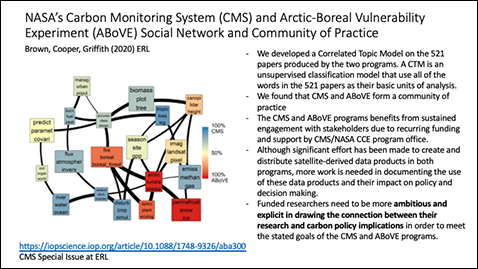
The ECCO-Darwin Data-assimilative Global Ocean Biogeochemistry Model: Estimates of Seasonal to Multi-decadal Surface Ocean pCO 2 and Air-sea CO 2 Flux
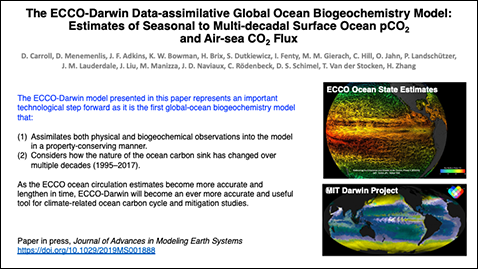
Previous Featured 2020 Publications:
- Hundred year projected carbon loads and species compositions for four National Forests in the northwestern USA
- Monitoring pinyon-juniper cover and aboveground biomass across the Great Basin
- Pervasive shifts in forest dynamics in a changing world
- A carbon monitoring system for mapping regional, annual aboveground biomass across the northwestern USA
- Synthesis of Methane Observations Across Scales: Strategies for Deploying a Multitiered Observing Network
- Biomass estimation from simulated GEDI, ICESat-2 and NISAR across environmental gradients in Sonoma County, California
- Satellite-based estimates reveal widespread forest degradation in the Amazon
- Spatiotemporal tracking of carbon emissions and uptake using time series analysis of Landsat data: A spatially explicit carbon bookkeeping model
- Methane emissions from underground gas storage in California
- Spatial heterogeneity in CO2, CH4, and energy fluxes: insights from airborne eddy covariance measurements over the Mid-Atlantic region
- Deriving high-spatiotemporal-resolution leaf area index for agroecosystems in the U.S. Corn Belt using Planet Labs CubeSat and STAIR fusion data
By the Numbers
15 CMS grants funded in 2019
457 CMS Pubs total
- 31 CMS pubs in Science Nature and PNAS
- CMS pubs have been cited 18303 times
111 CMS data products archived total
- CMS data products have been downloaded over 47000 times
Upcoming Events in 2020
CMS Science Team Meeting
November 17-19, 2020
AGU Fall Meeting December 7-11th 2020
B016 - Carbon Monitoring Systems Research and Applications
Greenhouse gas emission inventories, climate mitigation planning, forest carbon sequestration and Payment for Ecosystem Services (PES) programs, cap-and-trade systems, self-reporting programs, and their associated Monitoring, Reporting and Verification (MRV) frameworks depend upon data that are accurate, systematic, practical, and transparent. For carbon, there are multiple MRV frameworks in existence, reflecting a diversity of spatial scales, governing bodies, and relevant policies. Given the scientific challenges, policy importance, and breadth of activities occurring around the world, this session will focus on advances in research and applications, including decision support and policy, that align or address stakeholder needs through the measuring, modeling, and monitoring of strategic carbon pools. This session will also feature a panel of Stakeholders representing Local, State, and National Government Agencies and NGOs.
https://agu.confex.com/agu/fm20/prelim.cgi/Session/101319
